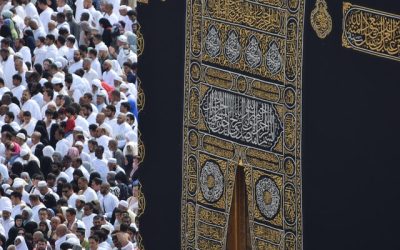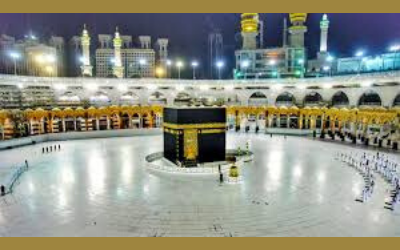O Travellers to the Haram!
By Maulana Muhammad Wali Raazi
———————-
Originally published in Urdu in Daily Ummat Karachi on 12 December 2004
Oh guests of the Most Merciful! Oh fortunate ones! Oh travelers to the Haram! Congratulations on being invited by the Lord of the worlds! Be glad that He has invited you to His House! Not only that, but He has given you the provisions for travel and lodging. And not only that, but He has also filled your hearts with such love of Him and His House that today you leave your homes, your cities, your countries and embark on this journey solely for the pleasure of your Lord. Had this desire not been there then you would have never planned to undertake this journey.
How many a millionaire are there who travel throughout
Hazrat Thanwi Rahmatullahi alayhi has written that when Prophet Ibrahim, alayhi salam, got tired running the knife, he said to the knife: Why don’t you cut? The knife responded: You have been commanded to cut, and I have been ordered not to cut; do your job, I am doing mine. Then a ram was sent from the heavens and the test was complete.
We were pleased with this act of Our friend – now you also imitate him. We have provided you with animals – otherwise where would you have wandered in search for animals? We have also provided their food – otherwise where would you find food for them in this dry, arid land? Now the animals are there, the knife is ready, just run the knife and your work is done! Then, We will do Our work: We will accept this sacrifice just as We accepted the sacrifice of Our friend and We will endow you with such rewards as never could even occur to you in your thoughts.
This is Our city and Our House. Come here as a devotee; if you are not a devotee, then take on the appearance of a devotee! Be content in whatever condition We keep you in. Here there are crowds of devotees. You will be pushed and shoved; your hair will fill with dirt and dust, and your feet will tire from walking. Be it pushing or shoving, dirt and dust, or difficulties in Our alleys – Our devotees are proud of such difficulties and consider them as the treasures of their lives.
Whoever thinks of these hardships and pains as calamities should not come. He should stay at his home. But those who come as devotees – We will wipe out their sins and return them to their homes as if they were just born today. This is a bathing of bodies and souls rotten and spoiled due to sins – washing these sins will require rubbing. Without rubbing how is cleanliness obtained?
Oh travelers to the Haram! Hajj is no small blessing. This is a great act of worship – very different from all the other forms of worship. All sorts of outward and inward worships are combined in this. Money is spent in the path of Allah and great effort is exerted; it is a purification of the soul of the highest degree; it contains spiritual exercises; there is patience and gratitude, love and ma’rifah. It is a witnessing of the favors of the Almighty and of the acceptance of duas. There is both outward and inward closeness. In a hadith, Rasoolullah Sall-Allahu alayhi wa sallam addressed those performing Hajj and Umrah – and today you are his addressees:
Sayyidna Abu Hurairah Radi-Allahu anhu narrates that Rasoolullah Sall-Allahu alayhi wa sallam said: (translation) The travelers of Hajj and Umrah are Allah’s special guests; if they supplicate to Allah, He accepts their supplications and if they seek forgiveness, He forgives them. (Hisn-e-Hasin, Ibn Majah and Nasai)
Abu Hurairah (RA) narrates that Rasulullah (sallallahu alayhi wasallam) said: “The travelLers of Hajj and Umrah are Allah’s special guests; if they supplicate to Allah, He accepts their supplications and if they seek forgiveness, He forgives them.” (Hadith)
Oh travelers to the Haram! Years of spiritual exercise and training may not yield the benefits that can be obtained from this, if only we understand them and have a will to seek them. Oh guests of Allah! I will not discuss with you the merits of Hajj, because if you did not know its merits than you would have never made this blessed intention (to go to Hajj). Neither will I mention its rites and rulings, because you can get all of this from books and training sessions for Hajj. Rather I want to point out something else.
You are going to the great Court of the King of kings. When a person is a guest of a king then he learns the manners of the court long before he goes there. Then when he reaches there, he monitors every deed of his making sure that it does not result in disrespect.
Oh travelers to the Haram! I wish to share with you an extremely beneficial recipe-one that you will neither find in books nor in lectures. I know that pilgrims are subject to numerous difficulties and hardships. In this journey, there are many trying moments, no, rather many trying hours and days. Sometimes there is the immigration obstacle. There are the difficulties in finding lodging and in getting to the Haram. There are the hardships encountered in Tawaf and Sa’ee. But, my brothers! To achieve any big goal, you must undertake hardships. Those who are mentally prepared for this are the successful ones.
The recipe that I am presenting is called “tafweed”, which means entrusting your matters, i.e. entrusting your intentions and desires to Allah. The opposite of this is “tajweez” which means relying on your own plans and actions.
Tajweez is the root of all of our worries in our normal course of affairs and especially during the journey to Hajj. On the other hand, tafweed results in complete contentment. The person who in his difficulties leaves matters into the hands of Allah finds that Allah shows him ways out of his difficulties. When you reach the court of the King, then entrust your matters to the King. If he makes you sleep on the floor, then sleep happily on the floor. And if he makes you sit on the throne then sit on the throne remembering that you are in the court of the King. He has invited you here to honor you.
” Never lose sight of the true Beloved for even a blink of the eye
Lest the king glance at you with mercy and you be unaware. “
Many people return from Hajj and tell stories about the unmannerly behavior of the people there and magnify the difficulties they encountered there. One time I received a letter from an old man who said that: while you give people good tidings of Jannah, I went to Hajj but found no trace of the fear of God in the people therein. Then the man mentioned his difficulties in such words and talked about other pilgrims and the Saudi people in such a way that I felt sorrow over the way he mentioned this.
We are not going there to have a picnic. When millions of people gather in a city of three or four hundred thousand, then due to the crowd there will be pushing and shoving. The paths will be narrow and difficult. So undertake this journey as an ardent devotee. Whoever is ardent in the love of someone finds enjoyment in the difficulties he encounters on the way and contentment in these worries.
One time I went with my respected father Hazrat Mufti Muhammad Shafi Rahmatullah alayhi for Umrah in Ramadan. We were sitting in the Haram in front of the Rukn Yamani. The crowd was immense. People were jumping our shoulders. One Sudanese man jumped my shoulder and his leg hurt my neck. It slipped from my mouth, how rude these people are! I turned and saw that my father’s face had changed color and there were signs of anger. He stayed silent for a while and then said: Would you rather that these shoves strike another person who is sitting somewhere else desperately wishing to be here and enduring them, but could not get here? This was around 1974. This statement of my father changed my world completely. Now I wished to encounter more of these shoves.
Now some useful advice that Insha-Allah will be of benefit:
1. There are two types of actions during Hajj: wajibaat, obligatory duties, which must be performed and Mustahibbat, virtuous actions that are not required by Shariah. If you can do the Mustahibbat without incurring sin then that is a favor of Allah, otherwise you do not need to worry about them. For example, kissing the Black Stone has great blessings. But if in order to get this blessing you must push and shove and fight or mix with women then this blessing is of no use. If you sin in order to obtain that blessing than you have actually incurred a loss.
2. Women coming into the rows of men disrupt both their salats and the salat of their neighbors. Women should come early enough to the Haram to pray in the women’s sections. Otherwise, it is better for them to pray in their residence.
3. Praying forty salats with congregation in the two Harams is a very virtuous act, but it is not obligatory. Those who are far from the Haram or are sick or weak should not tire themselves hoping to achieve this blessing.
4. If a king commands someone in his court to ask him for something, asking him for lowly things is disrespectful. So, ask Him for forgiveness and His pleasure. Along with that also ask Him for your worldly needs, because that is too His command; had it not been His command, it would have been disrespectful.
5. It is not obligatory on those who are residing far from the Haram to offer every salat with congregation in the Haram. Rather, they should pray in a mosque close to their place of residence and plan according to their convenience.
6. Abstain to the utmost from hurting other servants of Allah. Doing so is a greater act of worship.
7. While living in Makkah, the most meritorious act of worship is Tawaf, so do as many Tawafs as possible.
May you enjoy being the guests of Allah and return to your homes with His pleasure and forgiveness. Amin. If you can remember then please do a favor by making dua for the forgiveness of this helpless servant.
Translated from Urdu by Muneeb Baig.
Courtesy: Al Balagh





0 Comments